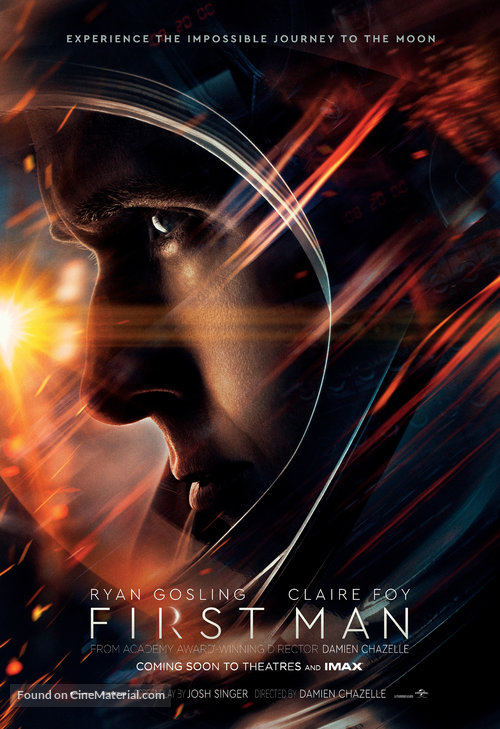
In 2014, Damien Chazelle introduced “Whiplash,” a compelling drama about a drummer in music school, to the world. The film was very well-received by critics and garnered five Academy Award nominations. Two years later, Chazelle’s “La La Land” hit theaters and received universal acclaim; the film received a whopping 14 nominations at the Oscars, tying the Academy’s record for most nominations received for a single piece of work. Needless to say, Damien Chazelle has set the bar pretty high for his movies.
Another two years go by and Chazelle directs “First Man,” a fictionalized retelling of the events that ultimately led up to Neil Armstrong placing the first man-made footprints on the moon. Admittedly, when I watched this film I went into the theaters with high expectations, considering Chazelle’s impressive track record. That prejudice would turn out to be a mistake, however, because even though I enjoyed the film, I ultimately left the theater wanting just a little bit more.
“First Man” chronicles the story of Neil Armstrong, played by Ryan Gosling, and his involvement with NASA’s program to send people to the moon for the first time. Gosling portrays Armstrong as a very intelligent and diligent scientist who refuses to give up despite several failed missions and close friends who have died, but who also is not particularly charming or likable. One memorable scene is during a press conference when Armstrong is asked what he plans to bring with him to the moon and he calmly replies, “If I had a choice, I’d take more fuel.” Gosling’s stoic facial expression and monotonous voice work perfectly for the character of Armstrong, who generally hid his emotions from peers, but Gosling’s acting ability is also tested in this film; during one scene in particular, Armstrong locks himself in his office after coming home from his infant daughter’s funeral and the audience can see on his face how much he struggles to contain his emotions, until he slowly breaks down and begins to sob uncontrollably. Moments like this showcase Gosling’s talent as an actor, but throughout the movie we don’t get to see much of Armstrong by himself; he is most often around others and keeps an impressive poker face so as not to let anyone know how he feels. I wish I could’ve seen more raw emotion from Gosling, but that doesn’t take away from the impact of his performance.
The rest of the cast works very well. Claire Foy is phenomenal as Armstrong’s wife, Janet, who ends up being the most compelling character in the film as she deals with the difficulties of raising two children and the fear of having an astronaut as a husband, who at any moment could die should his mission fail. Corey Stoll is wonderful as Buzz Aldrin, Armstrong’s pessimistic partner during the Apollo 11 mission to the moon. I laughed out loud several times watching Stoll create awkward moments by saying something he probably shouldn’t have said. Even Luke Winters, the child actor who plays Armstrong’s oldest son, is great in this film; the pain and confusion he feels can clearly be seen on his face as he gives his father a stern handshake before he leaves for the moon. The terrific work of the cast is definitely one of the highlights of this film.
Chazelle’s direction, though, is by far the best part of the film. The jerky camera movement during the flight scenes creates a chaotic atmosphere that makes the audience feel real fear for the characters on board. The sound design is fantastic. Every crash and explosion sounds incredibly real, and the sudden silence that fills the room when the camera moves from inside the lunar module to the moon’s surface showcases Chazelle’s impressive attention to detail. The visual effects are superb as well. I haven’t seen a space movie look that good since 2013’s “Gravity.” There’s no doubt that Damien Chazelle knows exactly what he’s doing when he metaphorically takes the wheel.
The film’s only flaw — and what made me leave the theater wanting more — was the writing. There were several scenes that seemed out of place with the rest of the movie; one scene focused on the protests against NASA and the amount of government money spent that could have been used for helping people in poverty, but this subject is not mentioned anywhere else in the film. I also felt that some more scenes could have been added to make it a bit more engaging. Stoll’s Aldrin was my favorite character, but he was only shown in two scenes before the final 30 minutes of the movie. Also, the famous words that Armstrong says as he steps onto the moon (“That’s one small step for man…”) are never explained. It would have been interesting to see how he came up with those particular words instead of hearing them for the first time during the conclusion. The ending itself was spoiled by the premise of the movie; everyone watching in the theater knew, without a doubt, that Neil Armstrong would make it to the moon, so there wasn’t really any tension created while watching that scene.
Ultimately, while its screenplay could have been tweaked, “First Man” is a very good movie with excellent directing and a cast that blew me away. I was a bit underwhelmed because of the writing, but I would definitely recommend the film to anyone who is a fan of effective filmmaking.
Rating: 4/5


